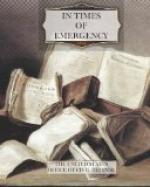—Stock an emergency supply of food and water, as well as emergency cooking equipment such as a camp stove. Some of this food should be of the type that does not require refrigeration or cooking.
—Make sure you have a battery-powered radio and extra batteries on hand, so that if your electric power is cut off you could still hear weather forecasts, information and advice broadcast by local authorities. Also, flashlights or lanterns would be needed.
—Consult page 72 of this handbook for other supplies and equipment that you may need if isolated at home. Be sure to keep on hand the simple tools and equipment needed to fight a fire. Also, be certain that all family members know how to take precautions that would prevent fire at such a time, when the help of the fire department may not be available.
* TRAVEL ONLY IF NECESSARY. Avoid all unnecessary trips. If you must travel, use public transportation if possible. However, if you are forced to use your automobile for a trip of any distance, take these precautions:
—Make sure your car is in good operating condition, properly serviced, and equipped with chains or snow tires.
—Take another person with you if possible.
—Make sure someone knows where you are going, your approximate schedule, and your estimated time of arrival at your destination.
—Have emergency “winter storm supplies” in the car, such as a container of sand, shovel, windshield scraper, tow chain or rope, extra gasoline, and a flashlight. It also is good to have with you heavy gloves or mittens, overshoes, extra woolen socks, and winter headgear to cover your head and face.
—Travel by daylight and use major highways if you can. Keep the car radio turned on for weather information and advice.
—Drive with all possible caution. Don’t try to save time by travelling faster than road and weather conditions permit.
—Don’t be daring or foolhardy. Stop, turn back, or seek help if conditions threaten that may test your ability or endurance, rather than risk being stalled, lost or isolated. If you are caught in a blizzard, seek refuge immediately.
* KEEP CALM IF YOU GET IN TROUBLE. If your car breaks down during a storm, or if you become stalled or lost, don’t panic. Think the problem through, decide what’s the safest and best thing to do, and then do it slowly and carefully. If you are on a well-traveled road, show a trouble signal. Set your directional lights to flashing, raise the hood of your car, or hang a cloth from the radio aerial or car window. Then stay in your car and wait for help to arrive. If you run the engine to keep warm, remember to open a window enough to provide ventilation and protect you from carbon monoxide poisoning.
Wherever you are, if there is no house or other source of help in sight, do not leave your car to search for assistance, as you may become confused and get lost.




